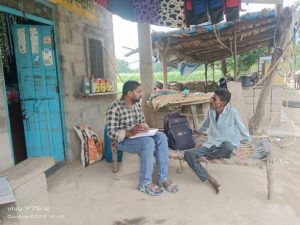Rajasthan grapples with significant challenges in healthcare, particularly in its rural and tribal-dominated districts. Udaipur, Banswara, Dungarpur, Jaipur, and Sawai Madhopur, home to two-thirds of the state’s 50 lakh+ tribal population, face a dire lack of quality healthcare. Infant mortality, nutrition, and immunization rates in districts like Udaipur and Dungarpur are below the state’s average. The COVID-19 pandemic further exposed the weaknesses in these regions’ healthcare systems, necessitating immediate and comprehensive interventions to address these longstanding challenges.
Recognizing these challenges, SAMRIDH, supported by the U.S Agency for International Development and managed by IPE Global, is enabling the scaling-up of the Amrit Clinic model of Basic HealthCare Services (BHS). The model embodies a comprehensive approach to addressing primary healthcare needs in the tribal and marginalized communities of Rajasthan. These clinics cater to tribal population in Udaipur and Dungarpur, providing a wide array of services under one roof, including outpatient department (OPD), family planning, and maternal and child health services. They are equipped with a three-bed facility and staffed by nurses and visiting doctors, offering various family planning services.
A unique aspect of this model is its integration with community health volunteers (CHVs), who engage in outreach activities and operate on an incentive model. Moreover, BHS is piloting a financial insurance model (subscription model) in partnership with IIM-Udaipur. This model aims to provide sustainable, quality healthcare by allowing patients to access services for an annual fee, covering unlimited visits.
 The impact of the Amrit Clinics is evident in stories like of Ram (name changed to maintain anonymity), a 30-year-old from hamlet Kharda, village Rampura, block Bali in the Pali district of Rajasthan, whose ordeal with silicosis reflects the challenges of healthcare access in these regions. Initially, Ram sought help from smaller health facilities and traditional healers in Palanpur, Poshina, Amirgarh, and Bengali blocks of Gujarat spending about INR 200,000 without experiencing significant improvement. Subsequently, Ram received valuable advice from fellow villagers who had benefited from seeking treatment at the Amrit Clinic, Rawach Village, in Rajasthan. Acting on their recommendation, he visited the clinic, where he underwent a comprehensive medical evaluation, including X-rays and blood tests, leading to an accurate diagnosis of silicosis and tuberculosis.
The impact of the Amrit Clinics is evident in stories like of Ram (name changed to maintain anonymity), a 30-year-old from hamlet Kharda, village Rampura, block Bali in the Pali district of Rajasthan, whose ordeal with silicosis reflects the challenges of healthcare access in these regions. Initially, Ram sought help from smaller health facilities and traditional healers in Palanpur, Poshina, Amirgarh, and Bengali blocks of Gujarat spending about INR 200,000 without experiencing significant improvement. Subsequently, Ram received valuable advice from fellow villagers who had benefited from seeking treatment at the Amrit Clinic, Rawach Village, in Rajasthan. Acting on their recommendation, he visited the clinic, where he underwent a comprehensive medical evaluation, including X-rays and blood tests, leading to an accurate diagnosis of silicosis and tuberculosis.
Ram diligently adhered to the prescribed treatment plan, completing a full nine-month course of medication. His commitment, combined with the guidance of the clinic’s doctors and staff, led to a remarkable improvement in his health. The cost of treatment was affordable, ensuring accessibility for individuals like Ram. Through this continuous care, he not only regained his health but also successfully overcame the challenges posed by silicosis.
Ram also applied for government aid for silicosis patients and received INR 300,000 as compensation, which has been instrumental in providing care to his family. His journey is a testament to the transformative impact of the AMRIT clinic that prioritizes accessibility, quality, and affordability, particularly in areas beleaguered by healthcare deficiencies. His story is a shining example of how targeted interventions, community involvement, and strategic support can profoundly impact individual lives and communities.
SAMRIDH is committed to support such instrumental initiatives that strengthen healthcare for the underserved populations. The financial and technical assistance provided by SAMRIDH has enabled BHS to expand its services, build a cadre of community healthcare volunteers, pilot the subscription model, secure additional funds from other donors, and progress towards self-sustainability.

